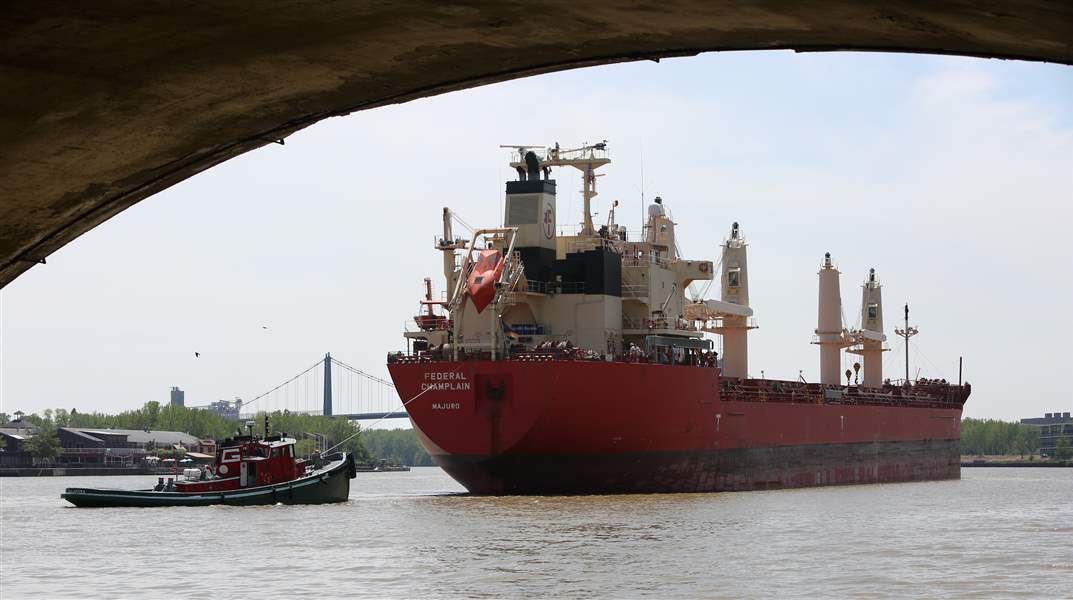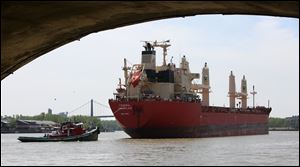
Ongoing union dispute at Toledo port shuts down overseas cargo shipments
7/2/2018
The Canadian boat Federal Champlain makes its way up the Maumee River. A dispute between Midwest Terminals of Toledo International and International Longshoremen’s Association Local 1982 has caused some ships to divert from Toledo's docks.
The Blade
Buy This Image
Labor strife has effectively shut down overseas cargo shipments to and from the Toledo-Lucas County Port Authority’s general-cargo docks.
“Just in the last month we’ve lost seven or eight vessels,” Alex Johnson, president of Midwest Terminals of Toledo International, said last week.
And with others in the process of canceling local bookings and determining alternative ports to handle their shipments, Mr. Johnson said the total ship diversions related to his company’s dispute with International Longshoremen’s Association Local 1982 could exceed 20.

The Canadian boat Federal Champlain makes its way up the Maumee River. A dispute between Midwest Terminals of Toledo International and International Longshoremen’s Association Local 1982 has caused some ships to divert from Toledo's docks.
A member of the port authority’s board of directors, meanwhile, has enlisted an outside lawyer to review the contentious labor dispute that has resulted in harbor pilots’ refusals to guide overseas-flag ships — known on the Great Lakes as “salties” — to and from the port-owned docks Midwest manages on the authority’s behalf.
“I will present what he brings to me and what the lease says we can legally do,” David Fleetwood, the business manager for Laborers’ Local 500, told his fellow port directors.
At issue is the years-old failure of Midwest and Local 1982 to negotiate a new labor contract for dock workers represented by the union.
In recent weeks, Midwest and Local 1982 have sent dueling memoranda to the port authority describing divergent versions of their contentious relationship.
Midwest’s timeline portrays a union in disarray whose officers twice have been thrown out by ILA leadership and has had racial discrimination issues within its own ranks. The local is now, for the second time, being run by a trustee from an ILA regional office in Cleveland.
Local 1982, meanwhile, alleges racism on Midwest’s part as the root of the impasse.
Its membership historically was overwhelmingly black while other unions with which the company has maintained labor peace are mostly white, although trustee William Yockey said in mid-May that it’s now about 40 percent black and 60 percent white.
Mr. Yockey last week disputed Mr. Johnson’s estimate of the potential lost business, arguing that only 14 salties visited the Midwest dock during all of last year, but said he’s “not shedding any tears for Midwest or the people not getting work” because he represents Local 1982 members that were “denied training” on equipment now used to handle cargo at the docks.
“The point of the exercise is to cause financial disruption to Midwest so they’ll see their way clear to sign a contract with us,” he said, repeating that Midwest’s tactics represent “complete and total discrimination.”
Mr. Johnson, in response, accused the union of urging its members to refuse equipment training that was offered to everyone qualified to work at the terminal.
The two sides can’t even agree now that Local 1982 still represents the dock workers.
Midwest withdrew recognition of the 32-member union early this year after it said it received signatures from a majority of members disavowing representation.
Local 1982 has challenged that decertification to the National Labor Relations Board and since then has set up minimal picket lines that have, on occasion, included a boat in the Maumee River.
The waterborne picket has proved to be the biggest thorn, as the pilots — legally required to escort the salties and provide navigational guidance to their foreign crews — have refused to pass it. In May, that action resulted in three salties being delayed, one by more than a week, at the dock after unloading their cargoes.
They finally left after their owners or agents negotiated a legal work-around with the Coast Guard under which tugboats were summoned and towed them away from the dock as “dead ships,” after which pilots then boarded the vessels without having to cross the ILA picket line.
Marc Gagnon, director of government affairs and sustainability at Fednav Ltd., said that company now will only accept cargoes destined to the port authority dock if the shipper or receiver will indemnify the company for daily detention or other costs that might arise from labor-related disruption.
Two Fednav ships were affected by the mid-May standoff: the Federal Champlain, which took the longest delay, and the Federal Kumano, which spent several unplanned days in port.
“Since then, we have had no ships going to Midwest,” Mr. Gagnon said. “We may have a cargo in the next week or so, but we have to discuss with our client that that ship could be struck, and that would cost money.”
The dispute has not affected Fednav vessels calling at other docks in Toledo’s port, such as the upriver grain elevators.
Nor does it affect Canadian or United States ships or barges calling at Midwest, because they are not legally required to use pilots for navigational assistance.
But John Szuch, the port authority directors’ chairman, said that for salties calling at the port-owned docks, “this year is shot” — an assessment with which Mr. Johnson concurred.
Lost cargoes include shiploads of imported pig iron, salt, bauxite, industrial minerals, and a shipload of bagged and bulk fertilizer that may be sent to Canada instead, Mr. Johnson said.
Midwest also has 50,000 to 60,000 tons of petroleum coke from a local refinery destined for northern Europe that may need to be loaded onto trains to go to another port, he said.
Mr. Gagnon said Fednav is disputing pilot charges that were assessed to his company’s ships even though the pilots refused to cross the ILA picket line.
The Lakes Pilots Association, which represents vessel pilots working in the Lake Erie sector, did not respond to a request for comment.
Contact David Patch at: dpatch@theblade.com or 419-724-6094.